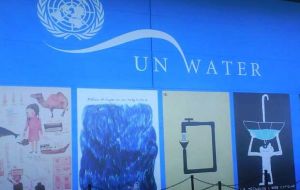MercoPress. South Atlantic News Agency
One billion people still lack drinking water, says UN

More than one billion people still lack access to safe drinking water, Secretary-General Ban Ki-Moon said on Monday, calling for greater efforts to achieve the water and sanitation targets set by world leaders in 2000.
As part of the set of anti-poverty targets known as the Millennium Development Goals (MDGs), countries have pledged to halve the number of people without access to safe drinking water by 2015. "There has been progress towards achieving the water and sanitation MDGs, but not enough," Mr. Ban said in a speech at an exposition in the Spanish city of Zaragoza on "Water and Sustainable Development." Expo Zaragoza 2008 is expected to draw 6.5 million visitors from around the globe and will feature presentations by over 2,000 international experts on water-themed exhibits, lectures, performances and concerts. Among those presenting at the Expo is UN-WATER -- consisting of some 25 UN bodies and a dozen international partners -- which monitors global progress on supplying safe drinking water and sanitation. Mr. Ban noted that since 1990, roughly 1.2 billion people have gained access to an improved source of drinking water. However, with rapid population growth and persistent poverty in parts of the developing world, the number of people without access has declined by only around 10 per cent. "There are still more than one billion people lacking access to safe drinking water, and two-and-a-half billion lacking access to basic sanitation facilities," he stated. "The international community, national governments and the private and non-profit sectors still have much work to do between now and 2015," the Secretary-General added. Among the challenges in this area is the fact that many public water utilities in the developing world are not financially sustainable. In addition, the pace of institutional and policy reform in the water sector is slow, and private sector investment in the water sector is not forthcoming. Also making the provision of safe water difficult is climate change, noted Mr. Ban. "As the earth warms, people who rely on snowfall and glaciers in high mountain ranges to replenish their water supplies have serious cause for concern." The Secretary-General added that the UN is trying to do everything in its power to help countries meet this threat with concerted action, noting that its focus now is on obtaining an international agreement under the auspices of the UN Framework Convention on Climate Change. In a related development, the UN Environment Programme (UNEP) said there is mounting evidence that climate change is triggering a shrinking and thinning of many glaciers worldwide which may eventually put at risk water supplies for hundreds of millions of people. A new report by UNEP and the World Glacier Monitoring Service (WGMS) confirms that the average annual melting rate of glaciers appears to have doubled after the turn of the millennium. At the same time, experts are warning that data gaps exist in some vulnerable parts of the globe, undermining the ability to provide precise early warning for countries and populations at risk. While excellent data stretching back through much of the 20th century exist for large parts of the world, including Europe and North America, the same cannot be said for some regions of the Tropics, Central Asia and the Polar regions, according to the two bodies, which have called for urgently stepping up monitoring of glaciers and ice caps in these areas.




Top Comments
Disclaimer & comment rulesCommenting for this story is now closed.
If you have a Facebook account, become a fan and comment on our Facebook Page!